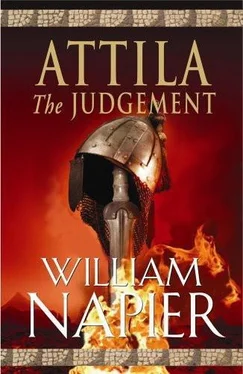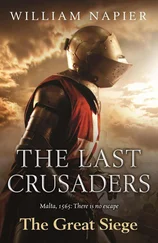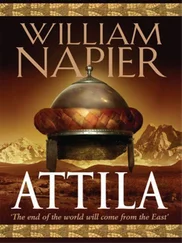William Napier - The Judgement
Здесь есть возможность читать онлайн «William Napier - The Judgement» весь текст электронной книги совершенно бесплатно (целиком полную версию без сокращений). В некоторых случаях можно слушать аудио, скачать через торрент в формате fb2 и присутствует краткое содержание. Жанр: Исторические приключения, на английском языке. Описание произведения, (предисловие) а так же отзывы посетителей доступны на портале библиотеки ЛибКат.
- Название:The Judgement
- Автор:
- Жанр:
- Год:неизвестен
- ISBN:нет данных
- Рейтинг книги:5 / 5. Голосов: 1
-
Избранное:Добавить в избранное
- Отзывы:
-
Ваша оценка:
- 100
- 1
- 2
- 3
- 4
- 5
The Judgement: краткое содержание, описание и аннотация
Предлагаем к чтению аннотацию, описание, краткое содержание или предисловие (зависит от того, что написал сам автор книги «The Judgement»). Если вы не нашли необходимую информацию о книге — напишите в комментариях, мы постараемся отыскать её.
The Judgement — читать онлайн бесплатно полную книгу (весь текст) целиком
Ниже представлен текст книги, разбитый по страницам. Система сохранения места последней прочитанной страницы, позволяет с удобством читать онлайн бесплатно книгу «The Judgement», без необходимости каждый раз заново искать на чём Вы остановились. Поставьте закладку, и сможете в любой момент перейти на страницу, на которой закончили чтение.
Интервал:
Закладка:
‘Do you see now?’ said Attila again. ‘No. I fear you still only half see.’
Another jab and flick, and there were two sightless eyeballs losing their lustre in the dust. The old man’s twin eyesockets welled with watery blood.
‘Now you see,’ said Attila. He released Nemesianus’ head from its lock and wiped his daggerblade clean on the old man’s robe. ‘Now you see.’
Nemesianus collapsed and lay groaning.
‘You will not, I fear, be able to see the imminent burning of your beloved city.’ He stowed his dagger inside his leather jerkin. ‘But you will smell it well enough.’
He looked at Orestes. The Greek nodded. And they rode back into Aquileia.
It was a great city, a great port, one of the greatest in all of Italy. And now? Now the site of Aquileia can barely be found. No more than a heap of stones over which the south wind sighs. Sighs and moves on.
After Aquileia, Attila rode on across Italy and burned Patavium, Vicentia, Verona, Placentia… At Mantua a local poet called Marullus addressed florid verses of praise to the conqueror. Attila had him burned on a pyre of his own books.
Not until he came to Mediolanum did he learn that Galla Placidia had died a year before. He ground his teeth and flogged the man who told him. That night he dreamed of staggering through a gallery of statues, sending them crashing to the ground, crushing them underfoot. Galla in a green stola stepped between them and vanished before he could break her. At the end of the hall sat a horned king on a wooden throne, his hands no more than claws, divested of kingly robes, nothing but a filthy loincloth on him, his old dugs sagging low, his hair matted with fur and feathers. The king raised his head slowly, eyes bloodshot, haggard, horror-struck and then the terrible smile…
Attila awoke, screaming.
Orestes calmed him. ‘We are getting near Rome.’
‘And Rome is coming to meet us,’ said Attila. Ravenna itself was no more than a court of chattering apes in togas. They still talked of buying Attila off.
Valentinian demanded to know, ‘Why? Why? What does he want?’
‘Do not enquire too deeply into that black heart, Majesty,’ Aetius said quietly ‘You might lose your way as in a midnight labyrinth, and never find the light again.’
‘He was a friend of yours, wasn’t he?’ The emperor was clutching himself now, staring at Aetius fixedly. ‘A great friend. You knew him well.’
‘A long time ago.’
Aetius set about marshalling the last band of soldiers he could.
In Mediolanum Attila had himself installed in the Imperial Palace, where he ceaselessly walked its endless marble corridors, muttering to himself. He seemed in no hurry to advance on Rome. Some whispered that he was filled with superstitious dread, remembering the fate of Alaric, who had marched into Rome triumphant and died only six days later.
Despair and fury competed in his breast. One day in a deserted vestibule he found a vast mural depicting the kings of Scythia kneeling in tribute to a succession of Roman emperors. Roaring through the deserted corridors of the palace, he demanded that the mural be repainted depicting himself on the throne and the emperors of Rome kneeling to him. Afterwards, for no obvious reason, he had the terrified mural-painters executed.
At other times he ranted of his grandiose plans, while his little force beyond the city walls ebbed by the day. He would soon take Rome, and then Constantinople – that would become his base. Then he would turn on the tottering Sassanid Empire of Persia, and then India, and finally the Great Wall. They would destroy China itself, the greatest and most ancient enemy of all…
He would be king of the world.
His men felt aimless and abandoned as they looted the country round about. Orestes stayed with him, as did the witch Enkhtuya and, on the farthest fringes, appearing and disappearing again daily like dew, the shaman Little Bird.
‘A king had a mighty empire once,’ said Little Bird, ‘but what did he give it away for? For a bigger empire.’
Attila frowned.
The shaman laughed. ‘The boundless and infinite Empire of Nothing.’ He dared to lay his hand on Attila’s hoar head. ‘O Little Father of Everything and Nothing.’
‘Silence, fool, or I shall take away your tongue.’
‘Take it freely, master. You have already taken everything else from your people.’
A savage blow, a stamp on his ankle, an agonised cry, and the little shaman limped from the palace.
A strange, feathered creature sat on a stone lion in the forum of Mediolanum and sang to the frightened people.
‘In our loneliness wandering
Stormcloud and empty steppe
We thought these things would never cease.
‘We saw the white man bowed to earth
With his swords and his spears and his gold,
His cities, his streets, his cloud-capped palaces,
And with the People’s land,
And with the vanished lion’s hide
He hunted to nothing, the fierce Libyan lion,
And we thought, this cannot last. This will cease.
‘Twice now, O my people, we have been wrong.’
He raised his arms up and laughed. The people of Mediolanum scurried away.
One day Little Bird tiptoed into the palace, and found his master seated alone on one of the old imperial thrones in a vast audience chamber. He was talking with himself, his eyes roving over the frescoed walls and ceiling, seeing nothing. Little Bird could have wept, but instead he sat down before the Great Tanjou and waited. Attila stared at him. At the heart of his madness was despair, as perhaps at the heart of sanity there is hope.
The King suddenly stood and swept his arm wide. ‘Be still and hear me, O People!’
Little Bird sat looking up at him, cross-legged and wide-eyed, a child in his seventh decade.
There was a long silence, Attila standing with his head hung low on his breast. Then he said, so softly that Little Bird strained to hear, ‘He is very wroth with us, he has utterly cast us off, we are rejected and despised. It is in the book of the Christians – I knew it as a boy. Long Roman winter afternoons with the pedagogue, a hostage, the cold sun sinking low beyond the bars. We are the people of Gog and Magog. I despised the bones and rags and worshipped fragments of the saints in their charnel-house churches, and the prophecies of their holy books, but now they come back to haunt me in my age. Now I go to the house of death myself with faltering steps, and I leave my people abandoned by their God.’
‘Oh, my mad master, do not say so.’
‘We will be blown away as the old song says, “like the wind, like the wind”. And of the great Hun people in after-years there will be neither sight nor sign in all the wide world, as if we had never been. And is it I…? A King of Kings from Palestine, a King of Terror from the East. Oh, my dreams are relentless now, they come to me nightly without cease, those seers and tellers beside the haunted stream beneath the trees in that misty morning in my boyhood long ago, when I had none but my beloved Orestes to comfort me. We laid his sister in the earth…’
Little Bird went to him.
Attila did not see. His eyes roved. ‘Comfort is not, consolation is not, in the midnight my heart murmurs that even the gods are not! You have taken the east from me, you have taken the west from me, you have taken my hate from me and my love from me; sad is my song now, my head is heavy, my heart hums a song of ash. And you who have taken all from me are nothing but a formless Void without voice or sense or feeling, the Beginning and the End of all things, for ever and ever.
‘Their prophecies hum about my ears like angry flies. Two empires were o’erthrown… One empire’s birth was Italy, the other was his own. And is it I…? It is a thought that I can hardly bear, oh, help me bear it, little shaman, as you would help an old man staggering under a burden. Fortune’s fool, history’s halfwit.’ He leaned forward and put his hands on Little Bird’s skinny shoulders.
Читать дальшеИнтервал:
Закладка:
Похожие книги на «The Judgement»
Представляем Вашему вниманию похожие книги на «The Judgement» списком для выбора. Мы отобрали схожую по названию и смыслу литературу в надежде предоставить читателям больше вариантов отыскать новые, интересные, ещё непрочитанные произведения.
Обсуждение, отзывы о книге «The Judgement» и просто собственные мнения читателей. Оставьте ваши комментарии, напишите, что Вы думаете о произведении, его смысле или главных героях. Укажите что конкретно понравилось, а что нет, и почему Вы так считаете.












